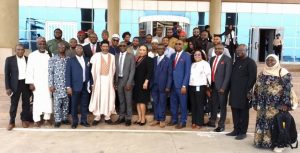Nigeria Moving In The Right Direction To Improve In NRI Rating
Maryam Aminu
With the increasing relevance of telecommunications in every sphere of human endeavor, deciding a telecom solution for the business now has not only technical significances but
also economical.
As agents of social and economic transformation in our nation, prioritizing network readiness is not only a strategic necessity but a mandate.
The Executive Vice Chairman of the Nigerian Communications Commission (NCC), Prof Umar Danbatta, said this at the opening ceremony of a 2-day Emerging Technology Forum for the Telecommunications Industry focusing on examining the issue of improving Nigeria’s ranking on the Global Network Readiness Index with the theme: “Contextualising the Network Readiness Index (NRI) for the Nigerian Telecommunications Industry,” on Thursday 24th of August,2023 in Abuja.
Danbatta disclosed that Nigeria is now rated 11th in terms of internet penetration and seventh in mobile phone usage globally
Representing the Executive Vice Chairman,the Head, Spectrum Database Management, NCC,Abraham Oshadami said “Nigeria is a telecommunications powerhouse, with 82% of the continent’s telecom subscribers and 29% of the continent’s internet consumption. Our nation rates eleventh globally in terms of internet penetration and seventh in terms of mobile phone usage. Despite these remarkable metrics, the fact that our Network Readiness Index (NRI) ranking for 2022 is 109th out of 131 countries is both humbling and challenging”
He said the NIR explores the performances of 131 economies in the four categories of technology (infrastructure), governance, people, and impact.
“The global data collected by the NRI team reveals that digital transformation is a global imperative in order to maximise the social and economic effects of the digital era.
He said: “It can create new inequalities, which can hinder the ability of younger generations to engage in the digital economy, but it also remains a powerful way to do more with less at all levels of income
The Executive Chairman tasked all stakeholders to grasp this opportunity to investigate emerging technologies, envision their potential applications, and determine how they can be leveraged to solve specific challenges.
“This platform is our gateway to innovative and disruptive solutions that can positively transform our industry. By engaging in conversations about new technologies, collaborating with global best practices and subject-matter experts, and pooling our insights, we open the door to unimaginable future possibilities,”said Danbatta
Speaking on Network Readiness in Nigeria, the keynote speaker,Prof. Bashir Shehu Galadinchi said that Nigeria is ready sake of the fact that the ICT sector is increasing and expanding rapidly well. Reminding that the Nigerian telecoms industry has continued to show a positive outlook, which is credited to the innovative and predictable telecoms regulatory environment implemented by the NCC.
Prof. Galadinchi added that the Telecommunications and ICT services contributed N2.508 trillion to Nigeria’s GDP in the first quarter of 2023,
He noted that Emerging technology requires massive investment infrastructure and needs a lot of capacity building for everyone especially for the youths as ICT brings about new ways of doing things more efficiently in a virtual world rather than the physical world.
He acknowledged that there are challenges but assured that Nigeria is moving in the right direction to ensure that her NRI rating will improve
Speaking earlier, the Head, New Media and Information Security, NCC, Engr. Dr Chidi Diugwu, in his opening remarks, said the Network Readiness Index (NRI), widely used for monitoring access and impact of Information and Communication Technology (ICT), is an invaluable tool for identifying gaps, stimulating action, structuring policy dialogue, and tracking ICT readiness over time.
Diugwu further said the Tech Industry is a focal point of Nigeria’s growth, demonstrated by the recent investments in infrastructure and digital services. Statistics from the National Bureau of Statistics indicate that Nigeria’s ICT sector contributed up to 14.07% to the total GDP in the first quarter of 2020, and this had grown to 17.47% by Q1 2023.
He called on stakeholders to embrace the insights offered by the NRI to guide our policies, investments, and collaborations to enable us to harness the potentials of emerging technologies.”
He reiterated on the need for investment in human capital and the fostering of innovation adding that it will unlock new opportunities, bridge the digital divide, and create a prosperous and inclusive digital future for Nigeria.
Delivering his Introductory Remarks,the Executive Commissioner– Technical Services Engr. Ubale A. Maska, said the primary objective of the forum is to provide standard roadmaps and best practices which can be used to measure the impact of Information & Communications Technology (ICT) on our society and promote the adoption of new technologies.
“We will review the latest findings of Nigeria’s NRI, explore various barriers and key drivers to the implementation of innovative technologies, and ultimately create actionable solutions to help move the industry forward.”
Maska added that we live in rapidly changing times where the proliferation of digital transformation and the use of ICTs are inevitable. With the world becoming increasingly interconnected and our economic activities relying heavily on the digital space, it has become essential for countries to be at the forefront in terms of technology adoption. This is why the Network Readiness Index (NRI) is so important to measure the progress of a country as it relates to ICTs and digital transformation.




